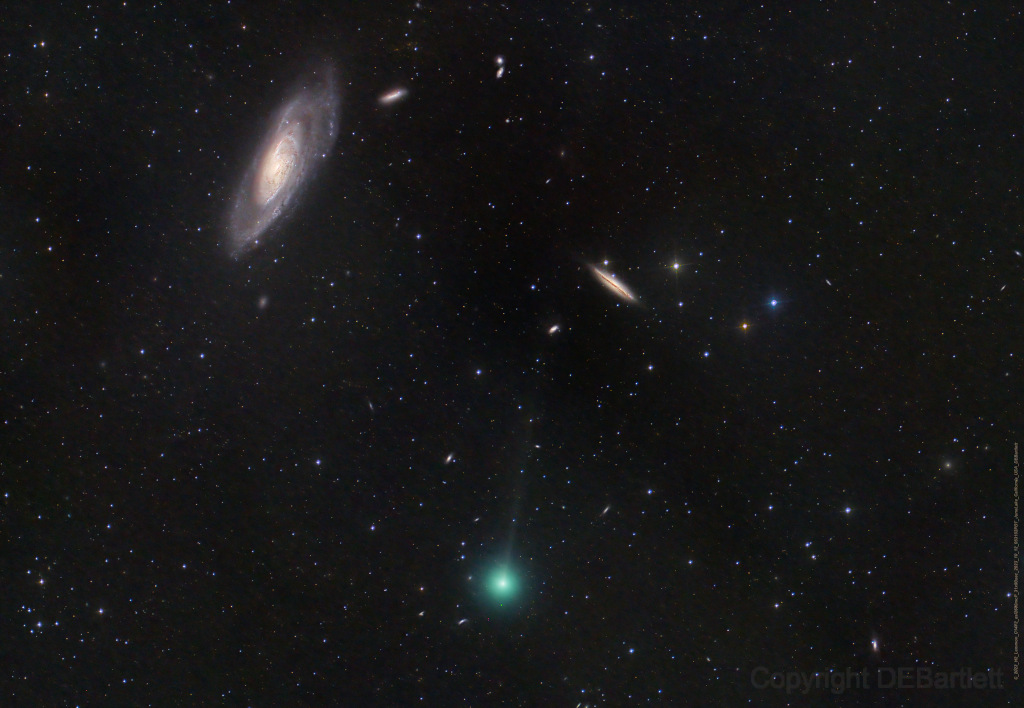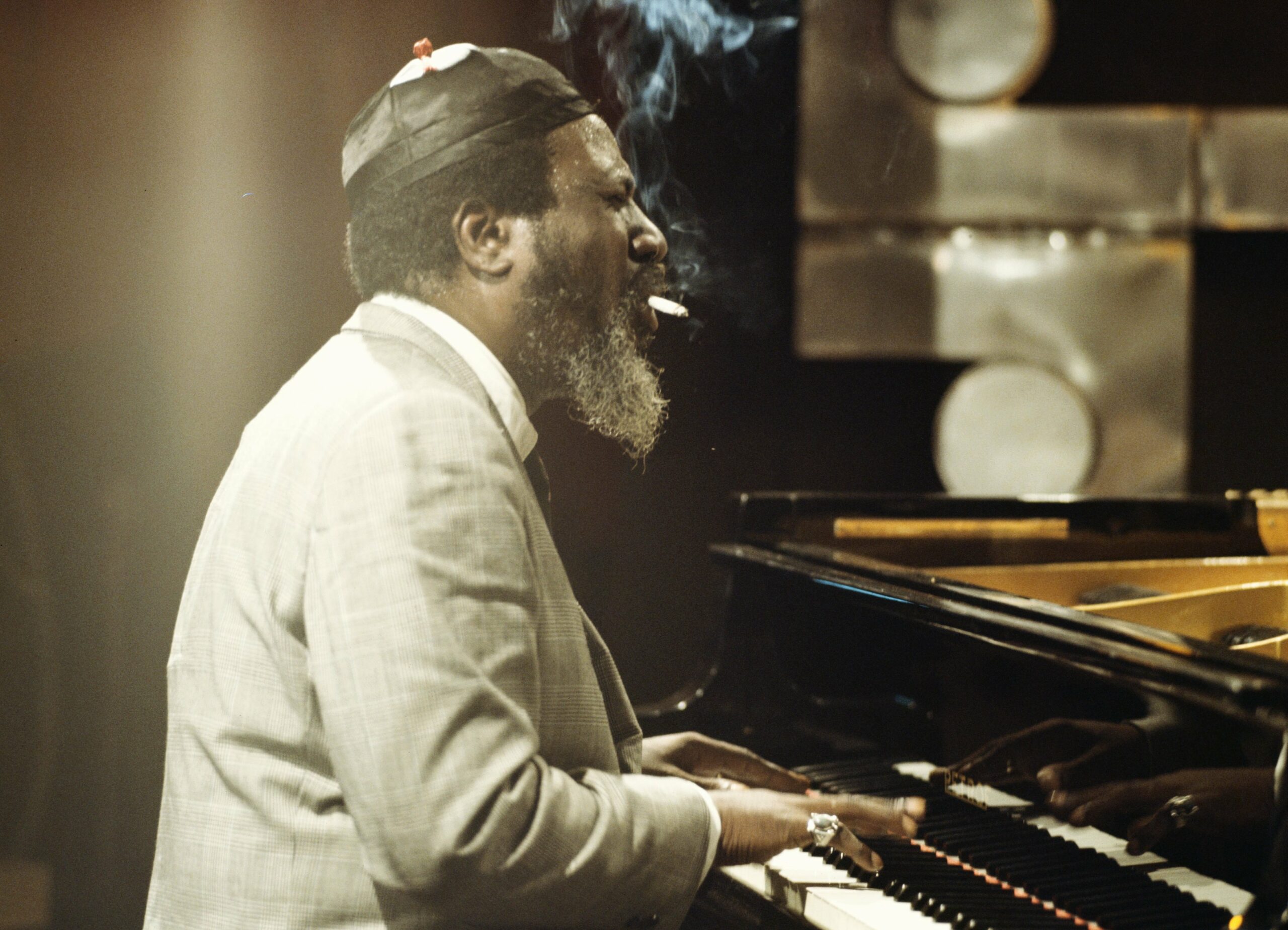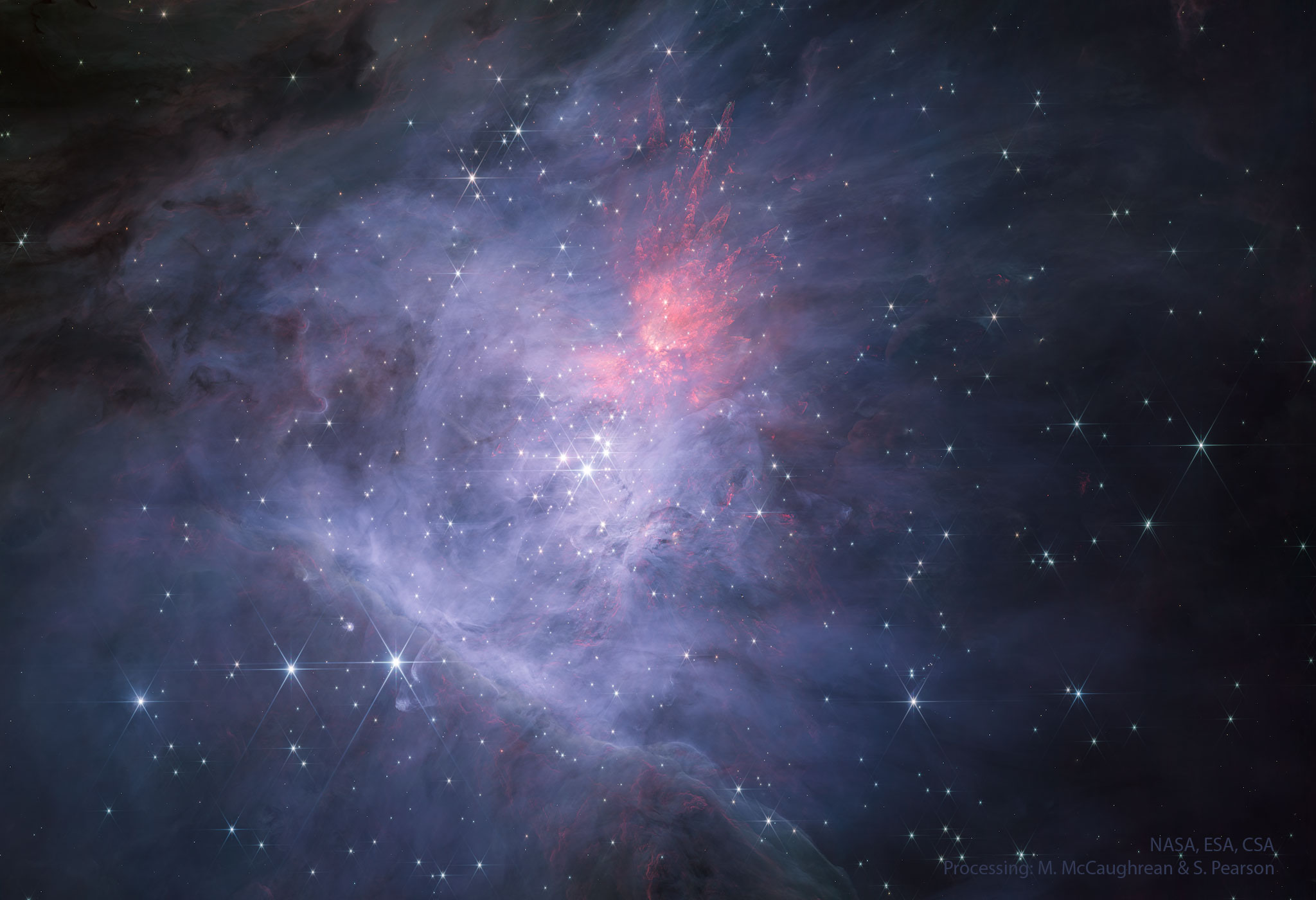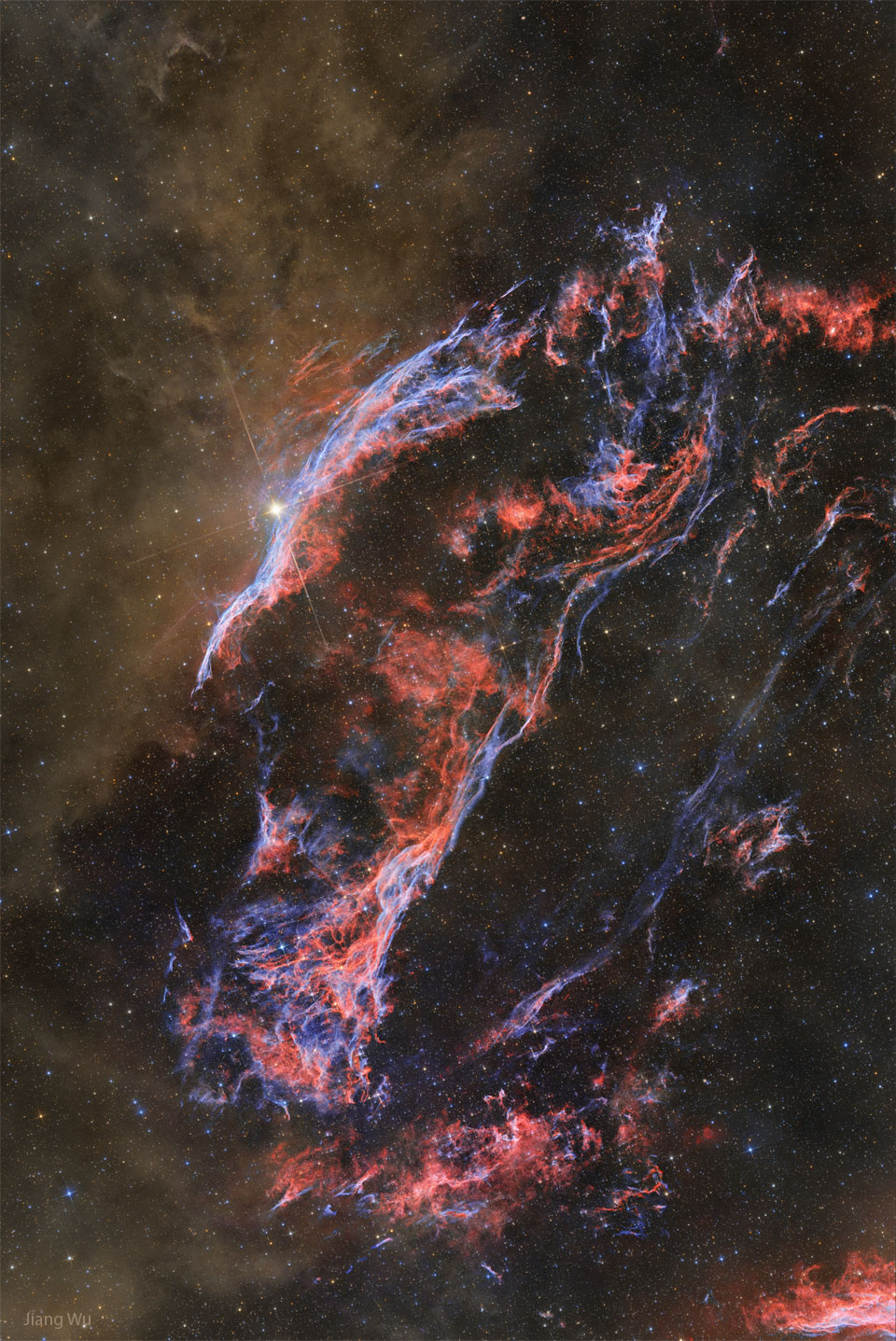Blog
Bates Motel Orchestra performing at the Village of Terror in Chippewa Valley, Wis 2010
more...Performing at the monthly Mt Zion Shabbat for the Soul with Tami Morse. Friday October 20th 6:30pm 2023
more...Galaxies abound in this sharp telescopic image recorded on October 12 in dark skies over June Lake, California. The celestial scene spans nearly 2 degrees within the boundaries of the well-trained northern constellation Canes Venatici. Prominent at the upper left 23.5 million light-years distant is big, beautiful spiral galaxy NGC 4258, known to some as Messier 106. Eye-catching edge-on spiral NGC 4217 is above and right of center about 60 million light-years away. Just passing through the pretty field of view is comet C/2023 H2 Lemmon, discovered last April in image data from the Mount Lemmon Survey. Here the comet sports more of a lime green coma though, along with a faint, narrow ion tail stretching toward the top of the frame. This visitor to the inner Solar System is presently less than 7 light-minutes away and still difficult to spot with binoculars, but it’s growing brighter. Comet C/2023 H2 Lemmonwill reach perihelion, its closest point to the Sun, on October 29 and perigee, its closest to our fair planet, on November 10 as it transitions from morning to evening northern skies.

Thomas Earl Petty (October 20, 1950 – October 2, 2017) was an American musician. He was the leader of the rock bands Tom Petty and the Heartbreakers and Mudcrutch. Petty was also a member of the late 1980s supergroup the Traveling Wilburys, and had success as a solo artist.
Petty had many hit records. Hit singles with the Heartbreakers include “American Girl” (1976), “Don’t Do Me Like That” (1979), “Refugee” (1980), “The Waiting” (1981), “Don’t Come Around Here No More” (1985) and “Learning to Fly” (1991). Petty’s solo hits include “I Won’t Back Down” (1989), “Free Fallin’” (1989), and “You Don’t Know How It Feels” (1994). Solo or with the Heartbreakers, he had hit albums from the 1970s through the 2010s and sold more than 80 million records worldwide, making him one of the best-selling music artists of all time. Petty and the Heartbreakers were inducted into the Rock and Roll Hall of Fame in 2002. Petty was honored as MusiCares Person of the Year in February 2017 for his contributions to music and for his philanthropy. He also had a minor acting career, most notably starring in a recurring role as the voice of Lucky Kleinschmidt in the animated comedy series King of the Hill from 2004 to the show’s end in 2009.
Petty died of an accidental drug overdose at the age of 66, one week after the end of the Heartbreakers’ 40th Anniversary Tour in 2017.
Petty was born on October 20, 1950, in Gainesville, Florida, the first of two sons of Kitty Petty (nee Avery), a local tax office worker, and Earl Petty, who was a traveling salesman. His brother Bruce was seven years younger.
more...Eddie Harris (October 20, 1934 – November 5, 1996) was an American jazz musician, best known for playing tenor saxophone and for introducing the electrically amplified saxophone. He was also fluent on the electric piano and organ. His best-known compositions are “Freedom Jazz Dance”, popularized by Miles Davis in 1966, and “Listen Here”.
Harris was born and grew up in Chicago. His father was from Cuba and his mother from Mississippi. He studied music under Walter Dyett at DuSable High School, as had many other successful Chicago musicians (including Nat King Cole, Clifford Jordan, Johnny Griffin, Gene Ammons, Julian Priester, and others). He later studied music at Roosevelt University; by that time he was proficient on piano, vibraphone, and tenor saxophone. While in college he performed professionally with Gene Ammons.
more...Charles Edward Ives ( October 20, 1874 – May 19, 1954) was an American modernist composer,one of the first American composers of international renown. His music was largely ignored during his early career, and many of his works went unperformed for many years. Later in life, the quality of his music was publicly recognized through the efforts of contemporaries like Henry Cowell and Lou Harrison, and he came to be regarded as an “American original”. He was also among the first composers to engage in a systematic program of experimental music, with musical techniques including polytonality, polyrhythm, tone clusters, aleatory elements, and quarter tones. His experimentation foreshadowed many musical innovations that were later more widely adopted during the 20th century. Hence, he is often regarded as the leading American composer of art music of the 20th century.
Sources of Ives’s tonal imagery included hymn tunes and traditional songs; he also incorporated melodies of the town band at holiday parade, the fiddlers at Saturday night dances, patriotic songs, sentimental parlor ballads, and the melodies of Stephen Foster.
Ives was born in Danbury, Connecticut, on October 20, 1874, the son of George (Edward) Ives (August 3, 1845 – November 4, 1894), a US Army bandleader in the American Civil War, and his wife, Mary Elizabeth Ives (née Parmelee, January 2, 1849 or 1850 – January 25, 1929). The Iveses were one of Danbury’s leading families, and they were prominent in business and civic improvement. They were similarly active in progressive social movements of the last century, including the abolition of slavery.
more...The core of the Tangos is the letra, three or four octosyllabic lines. As with the Bulerías, the the first line is often repeated, and the repeated lines are balanced by a longer consequent phrase.
Before a letra a Tangos may open with a guitar falseta or an estribillo, in which the singer sings a traditional melody with nonsense syllables (“le le le, ni, ni, etc.). The estribillo may return throughout the piece as a chorus after a letra.
Once the letra begins it can be broken up several times with remates performed by the dancer. This usually occurs between the first and second line of the letra, and often occurs more frequently, giving the dance a improvisatory air.
Thus, the letras themselves can be further broken up with remates or escobillas from the dancer or with guitar falsetas. A dancer may also choose to perform a long footwork passage accompanied by compás patterns from the guitarist and palmista (an escobilla performed “a palo seco” or dry, without guitar accompaniment).
As in Bulerías, Tangos can end with a cierre – a closing pattern – that is based on a different set of chords than the letras. The dancer can also perform a cue (llamada) that leads into a traveling exit – a salida.
It’s also common to end certain forms in flamenco with a macho, a transition into a faster, related form. Tangos wiil often end with a brief Rumba Flamenca. Similarly, Tientos will often end with a brief Tangos.
more...
Thelonious Monk performs in London in 1970.
The Great Nebula in Orion has hidden stars. To the unaided eye in visible light, it appears as a small fuzzy patch in the constellation of Orion. But this image was taken by the Webb Space Telescope in a representative-color composite of red and very near infrared light. It confirms with impressive detail that the Orion Nebula is a busy neighborhood of young stars, hot gas, and dark dust. The rollover image shows the same image in representative colors further into the near infrared. The power behind much of the Orion Nebula (M42) is the Trapezium – a cluster of bright stars near the nebula’s center. The diffuse and filamentary glow surrounding the bright stars is mostly heated interstellar dust. Detailed inspection of these images shows an unexpectedly large number of Jupiter-Mass Binary Objects (JuMBOs), pairs of Jupiter-mass objects which might give a clue to how stars are forming. The whole Orion Nebula cloud complex, which includes the Horsehead Nebula, will slowly disperse over the next few million years.

Farid al-Atrash (Arabic: فريد الأطرش; 1917 – December 26, 1974), also written Farid El-Atrache, was a Syrian-Egyptian singer, composer, and actor. Having immigrated to Egypt at the age of only nine years old with his mother and siblings, he studied there under numerous respected musicians.
Al-Atrash embarked on a highly successful career spanning more than four decades—recording 500 songs and starring in 31 movies.Sometimes referred to as “malek al-oud”, he is one of the most important figures of 20th- century Arab music.
more...Marcus Vinícius da Cruz e Mello Moraes (19 October 1913 – 9 July 1980), better known as Vinícius de Moraes and nicknamed O Poetinha (“The little poet”), was a Brazilian poet, diplomat, lyricist, essayist, musician, singer, and playwright. With his frequent and diverse musical partners, including Antônio Carlos Jobim, his lyrics and compositions were instrumental in the birth and introduction to the world of bossa nova music. He recorded numerous albums, many in collaboration with noted artists, and also served as a successful Brazilian career diplomat.
more...Willie Lee Perryman (October 19, 1911 – July 25, 1985), usually known professionally as Piano Red and later in life as Dr. Feelgood, was an American blues musician, the first to hit the pop music charts. He was a self-taught pianist who played in the barrelhouse blues style (a loud percussive type of blues piano suitable for noisy bars or taverns). His performing and recording careers emerged during the period of transition from completely segregated “race music” to rhythm and blues, which was marketed to both white and black audiences. Some music historians credit Perryman’s 1950 recording “Rocking With Red” for the popularization of the term rock and roll in Atlanta. His simple, hard-pounding left hand and his percussive right hand, coupled with his cheerful shout, brought him considerable success over three decades.
Perryman was born on a farm near Hampton, Georgia, United States, where his parents, Ada and Henry Perryman, were sharecroppers. He was part of a large family, though sources differ on exactly how many brothers and sisters he had. Perryman was an albino African American, as was his older brother Rufus, who also had a blues piano career as “Speckled Red“.
more...Laura Nyro born Laura Nigro; October 18, 1947 – April 8, 1997) was an American songwriter and singer. She achieved critical acclaim with her own recordings, particularly the albums Eli and the Thirteenth Confession (1968) and New York Tendaberry (1969), and had commercial success with artists such as Barbra Streisand and the 5th Dimension recording her songs. Wider recognition for her artistry was posthumous while her contemporaries such as Elton John idolized her. She was praised for her strong emotive vocal style and 3-octave mezzo-soprano vocal range.
Between 1968 and 1970, a number of artists had hits with her songs: The 5th Dimension with “Blowing Away“, “Wedding Bell Blues“, “Stoned Soul Picnic“, “Sweet Blindness“, and “Save the Country“; Blood, Sweat & Tears and Peter, Paul and Mary with “And When I Die“; Three Dog Night and Maynard Fergusonwith “Eli’s Comin’“; and Barbra Streisand with “Stoney End“, “Time and Love”, and “Hands off the Man (Flim Flam Man)”. Nyro’s best-selling single was her recording of Carole King‘s and Gerry Goffin‘s “Up on the Roof“.
Nyro was posthumously inducted into the Songwriters Hall of Fame in 2010, and into the Rock and Roll Hall of Fame in 2012, Nyro was born Laura Nigro in the Bronx, the daughter of Louis Nigro, a piano tuner and jazz trumpeter, and Gilda (née Mirsky) Nigro, a bookkeeper. Laura had a younger brother, Jan Nigro, who has become a children’s musician. Laura was of Russian Jewish and Polish Jewish descent, with Italian American ancestry from her paternal grandfather. Her father gave her the name “Laura”, after hearing the title theme of the 1944 film Laura, In late 1996, Nyro, like her mother, was diagnosed with ovarian cancer. After the diagnosis, Columbia Records, with Nyro’s involvement, prepared a two-CD retrospective of material from her years at the label. She lived to see the release of Stoned Soul Picnic: The Best of Laura Nyro in 1997.
more...Israelis performing on Arabic Instruments
more...The entire Veil Nebula spans six times the diameter of the full moon, but is so dim you need binoculars to see it. The nebula was created about 15,000 years ago when a star in the constellation of the Swan (Cygnus) exploded. The spectacular explosion would have appeared brighter than even Venus for a week – but there is no known record of it. Pictured is the western edge of the still-expanding gas cloud. Notable gas filaments include the Witch’s Broom Nebula on the upper left near the bright foreground star 52 Cygni, and Fleming’s Triangular Wisp (formerly known as Pickering’s Triangle) running diagonally up the image middle. What is rarely imaged — but seen in the featured long exposure across many color bands — is the reflecting brown dust that runs vertically up the image left, dust likely created in the cool atmospheres of massive stars.

Esperanza Emily Spalding (stylized in lowercase, born October 18, 1984) is an American bassist, singer, songwriter, and composer. Her accolades include five Grammy Awards, a Boston Music Award, a Soul Train Music Award, and two honorary doctorates: in 2018 from her alma mater Berklee College of Music and in 2022 (along with Charles Lloyd and Wayne Shorter) from CalArts.
From Portland, Oregon, Spalding began playing music professionally in her childhood, performing as a violinist in the Chamber Music Society of Oregon at age five. She was later both self-taught and trained on other instruments, including guitar and bass. Her proficiency earned her academic scholarships to Portland State University and the Berklee College of Music, both of which she attended, studying music.
Spalding released her first album, Junjo, in 2006 on the Spanish label Ayva Musica, after which she signed with the independent American label Heads Up, who released her 2008 self-titled album. Her third studio album, Chamber Music Society (2010), was a commercial success, charting at number 34 on the Billboard 200, and resulting in Spalding winning her first Grammy Award for Best New Artist; Spalding was the first jazz artist to win in this category. She saw further acclaim for her fourth release, Radio Music Society(2012), which earned the Grammy for Best Jazz Vocal Album, as well as the track “City of Roses” winning for Best Arrangement, Instrument and Vocals.
After spending the following several years performing as a supporting band player, Spalding released her fifth studio album, a funk rock-inspired concept album titled Emily’s D+Evolution, co-produced by Tony Visconti, on Concord Records. The following year, she released the album Exposure, which was limited to 7,777 copies. Her subsequent sixth studio record, 12 Little Spells, was released in 2019, and peaked at number one on Billboard’s Top Jazz Albums. The album also saw Spalding nominated for two Grammy Awards, winning in the Best Jazz Vocal Album category.
In addition to writing and performing music, Spalding has also worked as an instructor, first at the Berklee College of Music, beginning at age 20. In 2017, Spalding was appointed professor of the Practice of Music at Harvard University, a position she resigned from in 2022.
more...Wynton Learson Marsalis (born October 18, 1961) is an American trumpeter, composer, and music instructor, who is currently the artistic director of Jazz at Lincoln Center. He has been active in promoting classical and jazz music, often to young audiences. Marsalis has won nine Grammy Awards, and his oratorioBlood on the Fields was the first jazz composition to win the Pulitzer Prize for Music. Marsalis is the only musician to have won a Grammy Award in both jazz and classical categories in the same year.
Marsalis was born in New Orleans, Louisiana, on October 18, 1961, and grew up in the suburb of Kenner. He is the second of six sons born to Dolores Ferdinand Marsalis and Ellis Marsalis Jr., a pianist and music teacher. He was named after jazz pianist Wynton Kelly. Branford Marsalis is his older brother and Jason Marsalis and Delfeayo Marsalis are younger. All three are jazz musicians. While sitting at a table with trumpeters Al Hirt, Miles Davis, and Clark Terry, his father jokingly suggested that he might as well get Wynton a trumpet, too. Hirt volunteered to give him one, so at the age of six Marsalis received his first trumpet.
more...Charles Edward Anderson Berry (October 18, 1926 – March 18, 2017) was an American singer, guitarist and songwriter who pioneered rock and roll. Nicknamed the “Father of Rock and Roll“, he refined and developed rhythm and blues into the major elements that made rock and roll distinctive with songs such as “Maybellene” (1955), “Roll Over Beethoven” (1956), “Rock and Roll Music” (1957) and “Johnny B. Goode” (1958). Writing lyrics that focused on teen life and consumerism, and developing a music style that included guitar solos and showmanship, Berry was a major influence on subsequent rock music.
Born into a middle-class Black family in St. Louis, Berry had an interest in music from an early age and gave his first public performance at Sumner High School. While still a high school student, he was convicted of armed robbery and was sent to a reformatory, where he was held from 1944 to 1947. After his release, Berry settled into married life and worked at an automobile assembly plant. By early 1953, influenced by the guitar riffs and showmanship techniques of the blues musician T-Bone Walker, Berry began performing with the Johnnie Johnson Trio. His break came when he traveled to Chicago in May 1955 and met Muddy Waters, who suggested he contact Leonard Chess, of Chess Records. With Chess, he recorded “Maybellene”—Berry’s adaptation of the country song “Ida Red“—which sold over a million copies, reaching number one on Billboard magazine’s rhythm and blues chart.
By the end of the 1950s, Berry was an established star, with several hit records and film appearances and a lucrative touring career. He had also established his own St. Louis nightclub, Berry’s Club Bandstand. He was sentenced to three years in prison in January 1962 for offenses under the Mann Act—he had transported a 14-year-old girl across state lines for the purpose of having sexual intercourse. After his release in 1963, Berry had several more successful songs, including “No Particular Place to Go“, “You Never Can Tell“, and “Nadine“. However, these did not achieve the same success or lasting impact of his 1950s songs, and by the 1970s he was more in demand as a nostalgia performer, playing his past material with local backup bands of variable quality. In 1972 he reached a new level of achievement when a rendition of “My Ding-a-Ling” became his only record to top the charts. His insistence on being paid in cash led in 1979 to a four-month jail sentence and community service, for tax evasion.
Berry was among the first musicians to be inducted into the Rock and Roll Hall of Fame on its opening in 1986; he was cited for having “laid the groundwork for not only a rock and roll sound but a rock and roll stance.” Berry is included in several of Rolling Stone magazine’s “greatest of all time” lists; he was ranked fifth on its 2004 and 2011 lists of the 100 Greatest Artists of All Time and 2nd greatest guitarist of all time in 2023. The Rock and Roll Hall of Fame’s 500 Songs That Shaped Rock and Roll includes three of Berry’s: “Johnny B. Goode”, “Maybellene”, and “Rock and Roll Music”. “Johnny B. Goode” is the only rock-and-roll song included on the Voyager Golden Record.
more...More Posts
- Kanaka Dasa
- Corky Cornelius
- World Music Buzz’ Ayaz
- Daily Roots Scientist
- Cosmos NGC 1637
- Charlie Ventura
- Tal Wilkenfeld
- Wynton Kelly
- World Music Nusrat Fateh Ali Khan
- Daily Roots Prince Jammy-Black Uhuru
- Feeding The Hungry
- MAROONS Episcopal Church Home
- Michelangelo Achieving
- Rosa Parks Anniversary 2024
- World Aids Day 2024
- Cosmos NGC 1569
- Jaco Pastorius
- Bette Midler
- Ike Isaacs
- Sandy Nelson